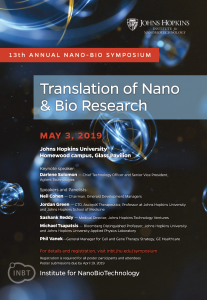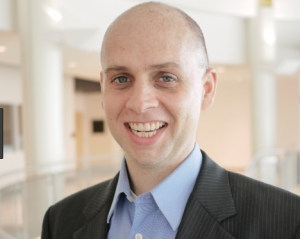The quick brown fox jumps over the lazy dog.
Meet Hopkins engineer and INBT researcher Stavroula Sofou tomorrow at our next Women in Cancer Research seminar. You will want to learn about, “impenetrable Tumors and Untargetable Cancers: Engineering Nanocarrier Surfaces to do the (Apparently) Impossible.”

The Annual Nano-Bio Symposium is our signature event to showcase and celebrate the latest discoveries in nanoscience from our multidisciplinary researcher teams. It brings students and top scholars from Hopkins, other institutions, and industry together to network, share knowledge and ideas, and foster new collaborations.
The theme for the 2019 Nano-Bio Symposium is Translation of Nano & Bio Research.

Cognitive impairment is a core feature of many psychiatric and neurological disorders. Currently available therapies do not significantly improve cognitive impairment. Dopaminergic neurotransmission in the prefrontal cortex is important for the regulation of cognitive function and therapeutic interventions that modulate dopaminergic function in the cortex could improve cognition. The enzyme catechol-O-methyltransferase (COMT) is a key regulator of dopaminergic tone in the cortex and hippocampus and individual variability in COMT function is associated with differences in cognitive function. Tolcapone, a COMT inhibitor, has been approved as a treatment for the motor symptoms of Parkinson’s disease but it has multiple features that prevent its widespread use as a cognitive enhancer including poor pharmacokinetics (PK) that require 3X/day dosing in patients and a black box warning for potentially fatal liver toxicity. Carr’s team developed non-nitrocatechol, COMT inhibitors with improved PK and safety profiles compared to tolcapone. They will describe multiple novel compounds with promising preclinical in vivo profiles that may be suitable for clinical trials testing their cognitive enhancement capabilities.
The Summer Seminar Series is co-sponsored by INBT and the Physical Sciences-Oncology Center.

The repertoire of naturally occurring proteins is limited and many molecules induce multiple conflicting effects. Protein engineering affords researchers the unprecedented capacity to create new molecules with novel and therapeutically useful activities. Researchers have traditionally taken an unbiased approach to protein engineering, but as our knowledge of protein structure-function relationships advances, we have the exciting opportunity to apply molecular principles to guide engineering. Leveraging cutting-edge tools and exclusive expertise in structural biology and molecular design, the Spangler Lab implements a unique structure-based engineering approach to elucidate the determinants of protein activity and inform drug development. Building on molecular insights, our group aims to redesign existing proteins and engineer new proteins to serve as targeted therapeutics to treat immune diseases such as cancer, infectious diseases, and autoimmune disorders.
The Summer Seminar Series is co-sponsored by INBT and the Physical Sciences-Oncology Center.

Zeolites are microporous framework silicates that are used widely in the chemical industry as heterogeneous acid catalysts, efficient ion exchangers, selective adsorbents for gas separations and as perm-selective dehydration membranes. They are also useful in other applications like water softening, as desiccants, and for adsorptive/catalytic treatment of automotive emissions. Zeolites have a wide range of compositions, and Dr. Tsapatsis’ will focus his talk on pure silica zeolites (zeosils) and high silica zeolites, i.e., zeolites with large ratio of silicon to substituents like Al, B, Ge, Sn, Ti that isomorphously replace silicon in the tetrahedral sites of the zeolite framework.
Michael Tsapatsis’ research group and collaborators have devoted more than two decades to study zeolite nucleation and crystal growth in efforts to create (i) nanometer-thin, oriented, and pinhole-free separation membranes, and (ii) hierarchical porous adsorbents and catalysts.
The Summer Seminar Series is co-sponsored by INBT and the Physical Sciences-Oncology Center

Jewell’s research combines immunology and biomaterials to understand the interactions between synthetic materials and immune tissues, and to design more selective therapeutic vaccines for cancer and autoimmunity.
Jewell will discuss new degradable polymer depots that could improve the selectivity of therapies for autoimmune diseases such as multiple sclerosis and diabetes by locally reprogramming the function of lymph nodes – tissues that coordinate immune function. Jewell will also discuss self-assemble immune signals into modular nanostructures.
The Summer Seminar Series is co-sponsored by INBT and the Physical Sciences-Oncology Center.


